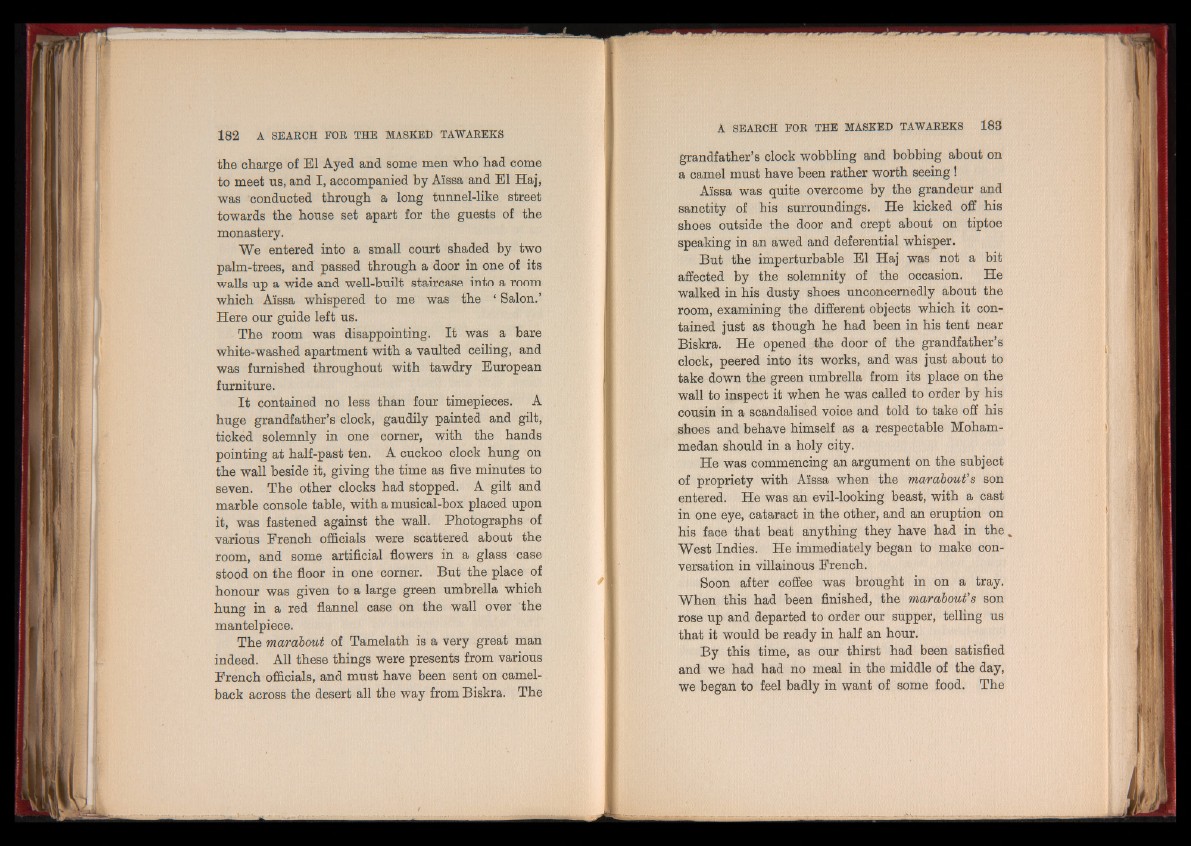
the charge of El Ayed and some men who had come
to meet us, and I, accompanied by Aissa and El Haj,
was conducted through a long tunnel-like street
towards the house set apart for the guests of the
monastery.
We entered into a small court shaded by two
palm-trees, and passed through a door in one of its
walls up a wide and well-built staircase into a room
which Aissa whispered to me was the ‘ Salon.’
Here our guide left us.
The room was disappointing. It was a bare
white-washed apartment with a vaulted ceiling, and
was furnished throughout with tawdry European
furniture.
I t contained no less than four timepieces. A
huge grandfather’s clock, gaudily painted and gilt,
ticked solemnly in one corner, with the hands
pointing at half-past ten. A cuckoo clock hung on
the wall beside it, giving the time as five minutes to
seven. The other clocks had stopped. A gilt and
marble console table, with a musical-box placed upon
it, was fastened against the wall. Photographs of
various French officials were scattered about the
room, and some artificial flowers in a glass case
stood on the floor in one corner. But the place of
honour was given to a large green umbrella which
hung in a red flannel case on the wall over the
mantelpiece.
The marabout of Tamelath is a very great man
indeed. All these things were presents from various
French officials, and must have been sent on camel-
back across the desert all the way from Biskra. The
grandfather’s clock wobbling and bobbing about on
a camel must have been rather worth seeing !
Aissa was quite overcome by the grandeur and
sanctity of his surroundings. He kicked off his
shoes outside the door and crept about on tiptoe
speaking in an awed and deferential whisper.
But the imperturbable El Haj was not a bit
affected by the solemnity of the occasion. He
walked in his dusty shoes unconcernedly about the
room, examining the different objects which it contained
just as though he had been in his tent near
Biskra. He opened the door of the grandfather’s
clock, peered into its works, and was just about to
take down the green umbrella from its place on the
wall to inspect it when he was called to order by his
cousin in a scandalised voice and told to take off his
shoes and behave himself as a respectable Mohammedan
should in a holy city.
He was commencing an argument on the subject
of propriety with Aissa when the marabout's son
entered. He was an evil-looking beast, with a cast
in one eye, cataract in the other, and an eruption on
his face that beat anything they have had in th e.
West Indies. He immediately began to make conversation
in villainous French.
Soon after coffee was brought in on a tray.
When this had been finished, the marabout's son
rose up and departed to order our supper, telling us
that it would be ready in half an hour.
By this time, as our thirst had been satisfied
and we had had no meal in the middle of the day,
we began to feel badly in want of some food. The